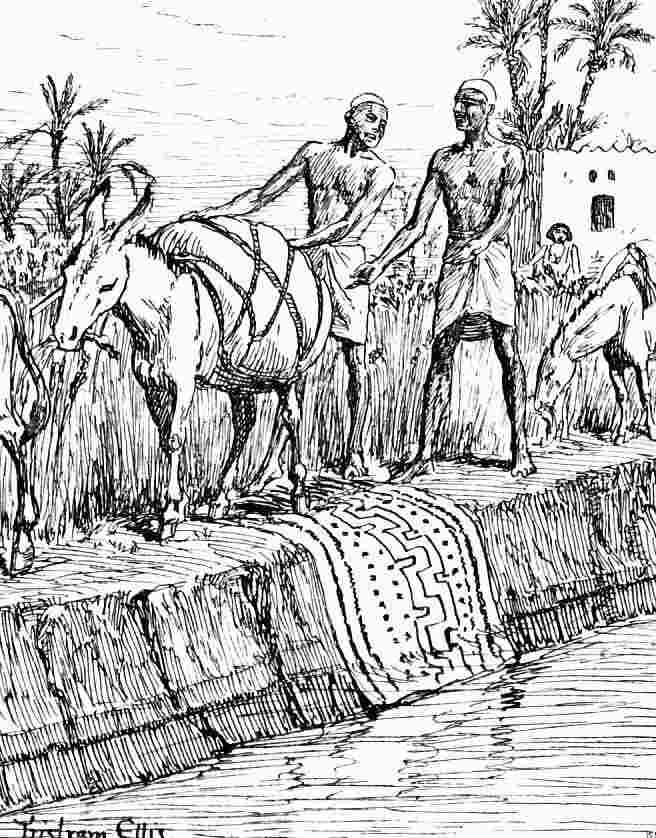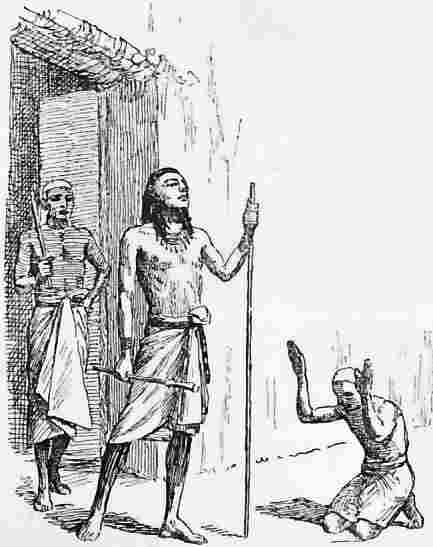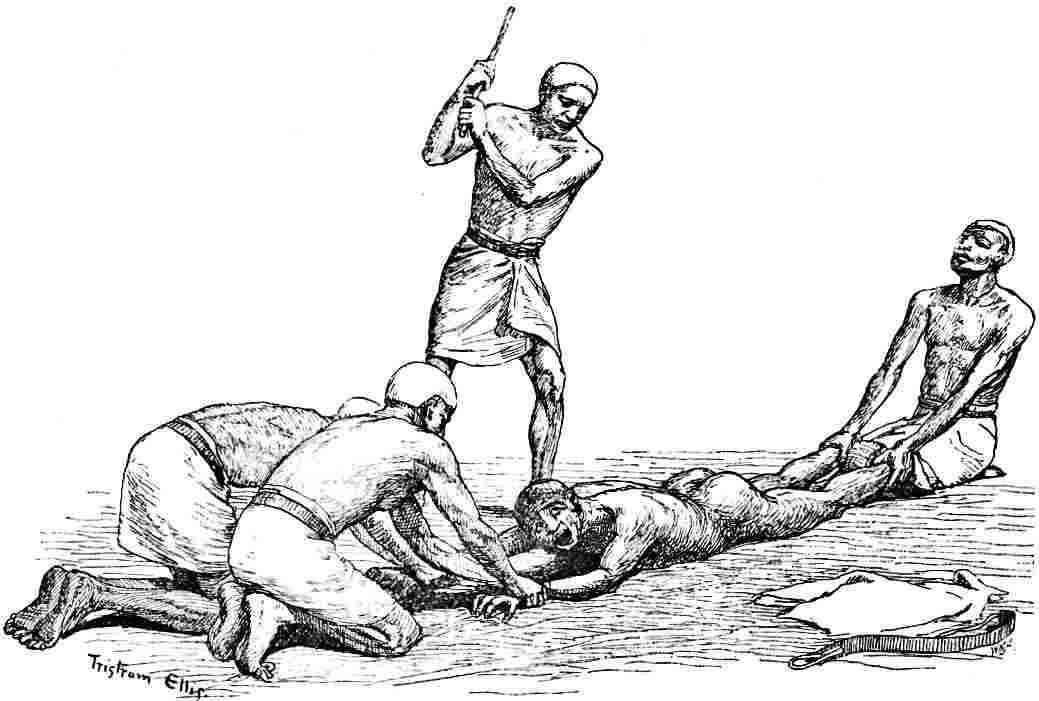
| Go to Overview Page. | File Modified: 2012-11-24 |

There dwelt in the Sekhet Hemat—or salt country—a peasant called the Sekhti, with his wife and children, his asses and his dogs; and he trafficked in all good things of the Sekhet Hemat to Henenseten. [end of Petrie's interpolated introduction] Behold now he went with rushes, natron, and salt, with wood and pods, with stones and seeds, and all good products of the Sekhet Hemat. And this Sekhti journeyed to the south unto Henenseten; and when he came to the lands of the house of Fefa, north of Denat, he found a man there standing on the bank, a man called Hemti—the workman—son of a man called Asri, who was a serf of the High Steward Meruitensa. Now said this Hemti, when he saw the asses of Sekhti, that were pleasing in his eyes, "Oh that some good god would grant me to steal away the goods of Sekhti from him!"
Now the Hemti's house was by the dyke of the tow-path, which was straitened, and not wide, as much as the width of a waist cloth: on the one side of it was the water, and on the other side of it grew his corn. Hemti said then to his servant, "Hasten and bring me a shawl from the house," and it was brought instantly. Then spread he out this shawl on the face of the dyke, and it lay with its fastening on the water and its fringe on the corn.

Now Sekhti approached along the path used by all men. Said Hemti, "Have a care, Sekhti! you are not going to trample on my clothes!" Said Sekhti, "I will do as you like, I will pass carefully." Then went he up on the higher side. But Hemti said, "Go you over my corn, instead of the path?" Said Sekhti, "I am going carefully; this high field of corn is not my choice, but you have stopped your path with your clothes, and will you then not let us pass by the side of the path?" And one of the asses filled its mouth with a cluster of corn. Said Hemti, "Look you, I shall take away your ass, Sekhti, for eating my corn; behold it will have to pay according to the amount of the injury." Said Sekhti, "I am going carefully; the one way is stopped, therefore took I my ass by the enclosed ground, and do you seize it for filling its mouth with a cluster of corn? Moreover, I know unto whom this domain belongs, even unto the Lord Steward Meruitensa. He it is who smites every robber in this whole land; and shall I then be robbed in his domain?"
Said Hemti, "This is the proverb which men speak: 'A poor man's name is only his own matter.' I am he of whom you spake, even the Lord Steward of whom you think." Thereon he took to him branches of green tamarisk and scourged all his limbs, took his asses, and drave them into the pasture. And Sekhti wept very greatly, by reason of the pain of what he had suffered. Said Hemti, "Lift not up your voice, Sekhti, or you shall go to the Demon of Silence." Sekhti answered, "You beat me, you steal my goods, and now would take away even my voice, O demon of silence! If you will restore my goods, then will I cease to cry out at your violence."

Sekhti stayed the whole day petitioning Hemti, but he would not give ear unto him. And Sekhti went his way to Khenensuten to complain to the Lord Steward Meruitensa. He found him coming out from the door of his house to embark on his boat, that he might go to the judgment hall. Sekhti said, "Ho! turn, that I may please thy heart with this discourse. Now at this time let one of thy followers whom thou wilt, come to me that I may send him to thee concerning it." The Lord Steward Meruitensa made his follower, whom he chose, go straight unto him, and Sekhti sent him back with an account of all these matters. Then the Lord Steward Meruitensa accused Hemti unto the nobles who sat with him; and they said unto him, "By your leave: As to this Sekhti of yours, let him bring a witness. Behold thou it is our custom with our Sekhtis; witnesses come with them; behold, that is our custom. Then it will be fitting to beat this Hemti for a trifle of natron and a trifle of salt; if he is commanded to pay for it, he will pay for it." But the High Steward Meruitensa held his peace; for he would not reply unto these nobles, but would reply unto the Sekhti.
Now Sekhti came to appeal to the Lord Steward Meruitensa, and said, "O my Lord Steward, greatest of the great, guide of the needy:
When thou embarkest on the lake of truth,
Mayest thou sail upon it with a fair wind;
May thy mainsail not fly loose.
May there not be lamentation in thy cabin;
May not misfortune come after thee.
May not thy mainstays be snapped;
Mayest thou not run aground.
May not the wave seize thee;
Mayest thou not taste the impurities of the river;
Mayest thou not see the face of fear.
May the fish come to thee without escape;
Mayest thou reach unto plump waterfowl.
For thou art the orphan's father, the widow's husband,
The desolate woman's brother, the garment of the motherless.
Let me celebrate thy name in this land for every virtue.
A guide without greediness of heart;
A great one without any meanness.
Destroying deceit, encouraging justice;
Coming to the cry, and allowing utterance.
Let me speak, do thou hear and do justice;
O praised! whom the praised ones praise.
Abolish oppression, behold me, I am overladen,
Reckon with me, behold me defrauded."
Now the Sekhti made this speech in the time of the majesty of the King Neb-ka-n-ra, blessed. The Lord Steward Meruitensa went away straight to the king and said, "My lord, I have found one of these Sekhti, excellent of speech, in very truth; stolen are his goods, and he has come to complain to me of the matter."
His majesty said, "As thou wishest that I may see health! lengthen out his complaint, without replying to any of his speeches. He who desireth him to continue speaking should be silent; behold, bring us his words in writing, that we may listen to them. But provide for his wife and his children, and let the Sekhti himself also have a living. Thou must cause one to give him his portion without letting him know that thou art he who is giving it to him."

There were given to him four loaves and two draughts of beer each day; which the Lord Steward Meruitensa provided for him, giving it to a friend of his, who furnished it unto him. Then the Lord Steward Meruitensa sent the governor of the Sekhet Hemat to make provision for the wife of the Sekhti, three rations of corn each day.
Then came the Sskhti a second time, and even a third time, unto the Lord Steward Meruitensa; but he told two of his followers to go unto the Sekhti, and seize on him, and beat him with staves. But he came again unto him, even unto six times, and said—
"My Lord Steward-Destroying deceit, and encouraging justice;
Raising up every good thing, and crushing every evil;
As plenty comes removing famine,
As clothing covers nakedness,
As clear sky after storm warms the shivering;
As fire cooks that which is raw,
As water quenches the thirst;
Look with thy face upon my lot; do not covet, but content me without fail; do the right and do not evil."
But yet Meruitensa would not hearken unto his complaint; and the Sekhti came yet, and yet again, even unto the ninth time. Then the Lord Steward told two of his followers to go unto the Sekhti; and the Sekhti feared that he should be beaten as at the third request. But the Lord Steward Meruitensa then said unto him, "Fear not, Sekhti, for what thou has done. The Sekhti has made many speeches, delightful to the heart of his majesty and I take an oath—as I eat bread, and as I drink water—that thou shalt be remembered to eternity." Said the Lord Steward, "Moreover, thou shalt be satisfied when thou shalt hear of thy complaints" He caused to be written on a clean roll of papyrus each petition to the end, and the Lord Steward Meruitensa sent it to the majesty of the King Neb-ka-n-ra, blessed, and it was good to him more than anything that is in the whole land: but his majesty said to Meruitensa, "Judge it thyself; I do not desire it."
The Lord Steward Meruitensa made two of his followers to go to the Sekhet Hemat, and bring a list of the household of the Sekhti; and its amount was six persons, beside his oxen and his goats, his wheat and his barley, his asses and his dogs; and moreover he gave all that which belonged unto the Hemti to the Sekhti, even all his property and his offices, and the Sekhti was beloved of the king more than all his overseers, and ate of all the good things of the king, with all his household.
Of the tale of the peasant and the workman three copies, more or less imperfect, remain to us. At Berlin are two papyri, Nos. 2 and 4, containing parts of the tale, published in fascimile in the "Denkmaler" of Lepsius vi. 108-110 and 113; while portions of another copy exist in the Butler papyrus; and lately fragments of the same have been collated in the collection of Lord Amherst of Hackney. These last have been published in the Proceedings of the Society of Biblical Archaeology, xiv. 558. The number of copies seem to show that this was a popular tale in early times; it certainly is of a more advanced type than the earlier tales of magic, though it belongs to a simpler style than the tales which follow. It has been translated partially by Chabas and Goodwin, and also by Maspero, but most completely by Griffith in the Proceedings of the Society of Biblical Archaeology, referred to above.
The beginning of the tale is lost in all the copies, and an introductory sentence is here added in brackets, to explain the position of affairs at the opening of the fragment. The essence of the tale is the difference in social position between the Sekhti, or peasant, and the Hemti, or workman—the fellah and the client of the noble; and the impossibility of getting justice against a client, unless by some extraordinary means of attracting his patron's attention, is the basis of the action. There is not a single point of incident here which might not be true in modern times; every turn of it seems to live, as one reads it in view of country life in Egypt.
The region of the tale is Henenseten, or Herakleopolis, now Ahnas, a little south of the Fayum. This was the seat of the IXth and Xth Dynasties, apparently ejected from Memphis by a foreign invasion of the Delta; and here it is that the High Steward lives and goes to speak to the king. The district of the Sekhti is indicated by his travelling south to Henenseten, and going with asses and not by boat. Hence we are led to look for the Sekhet Hemat, or salt country, in the borders of the Fayum lake, whence the journey would be southward, and across the desert. This lake was not regulated artificially until the XIIth Dynasty; and hence at the period of this tale it was a large sheet of water, fluctuating with each rise and fall of the Nile, and bordered by lagoons where rushes would flourish, and where salt and natron would accumulate daring the dry season of each year. At the present time the lake of the Fayum is brackish, and the cliffs which border it contain so much salt that rain pools which collect on them are not drinkable. The paths and roads of Egypt are not protected by law as in Western countries. Each person encroaches on a path or diverts it as may suit his purpose, only checked by the liberties taken by passers-by in trespassing if a path be insufficient. Hence, it is very usual to see a house built over half of a path, and driving the traffic into the field or almost over the river bank. In this case the Hemti had taken in as much of the path as he could, and left it but a narrow strip along the top of the canal bank. The frequent use of the public way for drying clothes, or spreading out property, gave the idea of choking the way altogether, and leaving no choice but trespassing on the crops. No sooner does a donkey pause, or even pass, by a field of corn than he snatches a mouthful, and in a delay or altercation such as this the beast is sure to take the advantage. Donkeys carrying loads by cornfields are usually muzzled with rope nets, to prevent their feeding; and even sheep and goats are also fended in the same way.
The proverb, "A poor man's name is only his own matter," refers to the independent fellah having no patron or protector who will take up and defend his name from accusations, as the interests of clients and serfs would be protected. This being the case, Hemti therefore seizes on the property, and drives the asses into his own pasture field.
The scene of Meruitensa laying the case before the nobles who sat with him is interesting as showing that even simple cases were not decided by one judge, but referred to a council. Similarly, Una lays stress on the private trial of the queen being confided to him and only one other judge. Apparently, referring cases to a bench of judges was the means of preventing corruption.
The speeches of the Sekhti were given at full length in the papyrus, but owing to injuries we cannot now entirely recover them; they are all in much the same strain, only the first and last are translated here, and the others are passed over. The style of these speeches was evidently looked on as eloquent in those days, and this papyrus really seems to show the time when long-drawn comparisons and flowery wishes were in fashion. It is far different from later compositions, as it is also from the earlier simple narration of crude marvels in the tales of the magicians.
The close of the tale is defective, but from the remains it appears to have ended by the gift of the Hemti's property to the oppressed Sekhti and the triumph of the injured peasant.